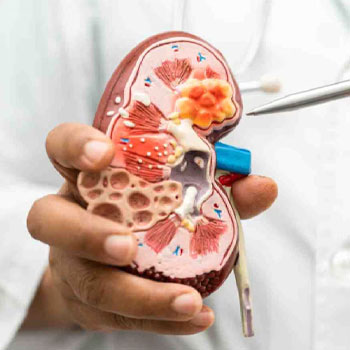renal diseases
What is Renal Disease?
Renal disease, commonly known as kidney disease, refers to conditions that impair kidney function. The kidneys, two bean-shaped organs located near the middle of your back, play a critical role in filtering waste and excess fluids from the blood, regulating blood pressure, balancing electrolytes, and producing hormones. When these functions are compromised, it can lead to significant health issues. For diabetic patients, understanding and managing renal disease is crucial to maintaining overall health and preventing complications.
Types of Renal Disease
Renal diseases can be broadly classified into acute and chronic conditions
Acute Kidney Injury
This sudden onset condition is often reversible if treated promptly. It can be caused by severe dehydration, infections, or the use of certain medications.
Chronic Kidney Disease
This is a long-term condition that usually progresses over time. Diabetes is a leading cause of CKD, which can eventually lead to end-stage renal disease (ESRD) requiring dialysis or a kidney transplant.

Connection Between Diabetes and Renal Disease
Diabetes is a major risk factor for developing renal disease. High blood glucose levels can damage the kidneys' filtering units, leading to diabetic nephropathy. Over time, this can cause the kidneys to lose their ability to filter waste effectively. Key indicators of diabetic nephropathy include protein in the urine (proteinuria), high blood pressure, and reduced kidney function.
Symptoms of Renal Disease
Early stages of renal disease may not present noticeable symptoms. However, as the disease progresses, symptoms may include
- Fatigue and weakness
- Swelling in the legs, ankles, or feet (edema)
- Persistent itching
- Changes in urination patterns (frequency, color, or amount)
- Shortness of breath
- Nausea and vomiting
- Confusion or difficulty concentrating
Diagnosing Renal Disease
Diagnosis of renal disease typically involves a combination of tests
- Blood Tests: Measuring levels of creatinine and urea nitrogen can indicate how well the kidneys are filtering waste
- Urine Tests: Detecting protein or blood in the urine can signify kidney damage.
- Imaging Tests: Ultrasounds or CT scans provide images of the kidneys to identify any abnormalities.
- Kidney Biopsy: In some cases, a small tissue sample from the kidney is examined under a microscope to determine the extent of damage.
Preventing and Managing Renal Disease for Diabetic Patients
Prevention and early management of renal disease are crucial, especially for diabetic patients. Here are key strategies to help maintain kidney health
Control Blood Sugar Levels
Keeping blood glucose levels within the target range is vital to prevent kidney damage. Regular monitoring and following a diabetes management plan are essential.
Manage Blood Pressure
High blood pressure can exacerbate kidney damage. Medications, a low-sodium diet, and regular exercise can help keep blood pressure under control.
Maintain a Healthy Diet
A balanced diet that includes fruits, vegetables, whole grains, and lean proteins supports overall health. Limiting salt, sugar, and processed foods can benefit kidney function.
Stay Hydrated
Drinking adequate water helps the kidneys flush out toxins. However, it's important not to overhydrate, especially for patients with advanced kidney disease.
Regular Check-ups
Routine medical check-ups with a healthcare provider can detect early signs of kidney disease, allowing for timely intervention.
Avoid NSAIDs and Certain Medications
Some over-the-counter pain relievers and prescription medications can harm the kidneys. Consult your doctor before taking any new medications.
Quit Smoking
Smoking can worsen kidney damage and increase the risk of cardiovascular disease, which is common in diabetic patients with renal disease.
Understanding renal disease is vital for diabetic patients to prevent and manage potential kidney complications. By maintaining healthy blood sugar and blood pressure levels, adopting a kidney-friendly diet, and undergoing regular medical check-ups, patients can protect their kidney health and enhance their overall well-being. If you experience symptoms or have concerns about your kidney function, consult with a healthcare professional for appropriate guidance and treatment.
